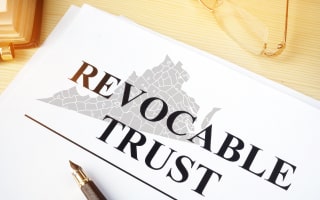How to Find Owners of Properties
in Virginia

If you're looking to buy or transfer real estate in the state of Virginia, property ownership is regulated by Title 55.1 of the state code. There are 32 chapters in this section of Virginia law, five of which deal with property conveyances. Understanding these regulations is crucial to ensuring a smooth and legal property transaction in Virginia.
The law also dictates how property should be recorded in Chapter 6 of this section. For example, a county or city clerk is required to record real estate transfers. A clerk can only refuse to enter the name of the property's owner if it doesn't legibly appear.
Individuals, joint owners, and legal entities are allowed to buy real estate in Virginia. Legal entities include LLCs and trusts. If you need to access a property's ownership records, there are many ways to do so. However, determining ownership when the property is held by a trust or corporation can be complicated.
How Do You Find Owners of a Property in Virginia?

There are several techniques you can employ to find property owners in Virginia, which include searching public records, using online resources, and hiring a title company. This process is detailed in the steps below. By utilizing these methods, you can efficiently gather ownership information and ensure a thorough search.
Registry of Deeds
A registry of deeds is a comprehensive database that maintains every recorded real estate document. Depending on where you live, this database might be available in your county or city. The information that's often kept in a registry of deeds includes real estate contracts, encumbrances, property tax records, and mortgages.
Most counties and cities in Virginia have online databases that the public can use to access this info. The online databases for some of the most populous counties and cities in Virginia are linked below:
- Fairfax County
- Prince William County
- Virginia Beach city
- Loudoun County
- Chesterfield County
- Henrico County
- Chesapeake city
- Arlington County
- Richmond city
- Norfolk city
Land Records Website
Virginia and records are usually drafted when a property is first transferred from the government to a developer or owner. These records are updated whenever a new sale, lien, easement, lease, or mortgage occurs. Every county in Virginia maintains land records that are typically available at the clerk's office. Once you reach the Virginia land records database for the county or city you live in, you'll need to enter the address, parcel number, or name of the property owner to search.
City or Town Assessor's Office
You can also visit your local assessor's office to ask for physical property records that you can review. Every city or county in Virginia has an assessor's office. Keep in mind that assessors are tasked with calculating the fair market value of every property in Virginia, which means that they collect and maintain property assessment records, tax assessment records, and maps. Use the following links to enter your county or city assessor's website:
- Fairfax County
- Prince William County
- Virginia Beach city
- Loudoun County
- Chesterfield County
- Henrico County
- Chesapeake city
- Arlington County
- Richmond city
- Norfolk city
Tax Records
Property tax records are some of the documents that are held at your assessor's office. These records list assessed values, tax history, and current ownership information. If you want to review property tax records, use the property search database in your county to search for them.
Title Company/Agency
A title company is a type of business that offers property search services. They maintain databases of property records that include everything from the latest renovations to the ownership history. These services can cost anywhere from $70-$200 in Virginia.
If you need to find the name of a property owner, you can also ask local lawyers or real estate agents. The neighbors might also give you this information. Some real estate websites maintain property ownership details as well. Additionally, you can consult with a title company for a more comprehensive search of ownership records.
![]() Commercial Services
Commercial Services
Third-party real estate websites give you access to a lot of property ownership information. While these records aren't as comprehensive as the official ones, you'll receive everything from deed records to neighborhood statistics with a single search. If you decide to use commercial services, consider PropertyChecker.com. Their database includes records for more than 155 million properties in the country. Once you perform a search with the parcel ID or property address, you'll receive the following information:
- Lien records
- Deed records
- Owner names
- Previous sales history
- Neighborhood info
- Current assessed and market values
- Foreclosure details
- Building permit details
- Tax records
- Loan records
- Property details
What Are the Different Types of Property Ownership in Virginia?

In Virginia, property ownership can occur when spouses buy their dream home or companies purchase real estate for future expansions. Knowing about the different types of ownership may help you choose the right option for your situation. Keep in mind that your choice can influence everything from the liability and risk to your taxes and access to finance.
There are several types of property ownership in Virginia. Each type comes with its own legal and financial implications. The most common forms of ownership include sole ownership, joint ownership, and tenancy in common. The following chart highlights the benefits and implications of every type of property ownership.
-
Sole Ownership: One individual has full ownership rights to a home or building. Control over every property decision. Liability for taxes and debts that build up over time.
-
Joint Tenancy: Can be owned by at least two people with equal shares. The transfer is easy to make after death. When an owner sells their share, the joint tenancy is eliminated.
-
Tenants by Entirety: A variation of joint tenancy that married couples use. Survivorship rights and safeguard from creditors. Each spouse must agree on property decisions.
-
Community Property: A type of property that's owned by both spouses during a marriage. Equal rights to sell and use the property. The home must be equally divided after a divorce.
-
Tenancy in Common: Multiple owners have equal or unequal shares without having survivorship rights. One owner can sell their shares without input from the other owners. Arguments might arise over managing or transferring the property.
-
Condominium Ownership: People own units in a complex with shared common areas. Full ownership over personal living space. Often subject to HOA fees and rules.
-
Cooperative Ownership: Residents collectively own a building. Owners have low purchase costs and ample community control. Selling shares requires approval from all other members.
-
Trust Ownership: Property can be placed in a trust for one or more beneficiaries. Assets are protected from creditors. Property isn't easy to manage or transfer.
-
Life Estate: Ownership lasts for as long as the holder of the title is alive. Legally able to benefit from the home. The remainderman must approve of any property transfer or sale.
Finding the Owner of a Trust or Corporation that Owns Properties in Virginia

Along with an individual buying real estate, it's possible for properties to be held by a limited liability company, C or S corporation, trust, or partnership. If you're interested in learning the name of a property owner, consider requesting assistance from a real estate attorney or title company.
If you wish to take these steps on your own, you may need to use business research tools like Westlaw or LexisNexis. You can also contact your local chamber of commerce to inquire about an owner. You might be able to obtain the right information by cross-referencing public records, such as mortgages and deeds.
Finding the Owner of a Trust in Virginia
Unlike most real estate transactions, the owner's name doesn't need to be recorded when establishing a trust. However, you may be able to find the name of the owner by contacting a real estate lawyer or using PropertyChecker.com.
Finding the Owner of an LLC in Virginia
The State Corporation Commission in Virginia offers an online database that allows the public to search for limited liability companies. If you know the partial or full name of the company you're interested in, you should be able to find it. You could also check the company's website if you're having difficulty identifying the owner's name.
Finding the Owner of a Corporation in Virginia
To identify the owner of a corporation in Virginia, use the Clerk's Information System (CIS). You can input the entity's name or ID number to locate a specific business. The information you receive should list the names of the current owners.
Common Methods of Property Transfer in Virginia

When establishing ownership of a home or commercial building, a property deed must be drafted. This document includes the following information:
- The purchase price
- Buyer and seller
- Signatures from buyer and seller
- Legal description of the property
While Virginia has warranty deeds and grant deeds, the most common versions are detailed below.
-
Quitclaim Deed: A quitclaim deed indicates that the property is being transferred. However, it doesn't guarantee a clear title. These deeds are most often used between family members or friends.
-
General Warranty Deed: General warranty deeds offer a considerable amount of protection. Buyers are given the full right to sell the property. They also receive a guarantee that the property doesn't contain any liens or encumbrances. These deeds protect against future claims as well.
-
Special Warranty Deed: A special warranty deed only guarantees that there are no outstanding liens or claims that were incurred when the current owner had possession of the home. If the claim is made from a previous owner, it won't be covered with this type of deed.
Step-by-Step Guide to Property Transfer in Virginia

Before you transfer or sell a home, make sure you brush up on the administrative and legal steps that must take place during a real estate transaction. Conveying a title in Virginia involves everything from understanding the type of Virginia real estate transfer to drafting the deed.
First, identify the type of transfer you're going to use. If you're selling your home to a buyer, the transfer process should be straightforward. It can, however, be more complicated if you're transferring property for business reasons or providing real estate as a gift. Every Virginia real estate transfer type comes with different requirements.
Once you've selected the right transfer type, you'll need to obtain a title search. The purpose of this search is to determine if there are any encumbrances or liens that need to be addressed. If the IRS has placed a lien on the property, it will be identified during a title search. Consider buying insurance as well to protect against any title issues that might be caught in the future. Most lenders require title insurance.
Before the Virginia real estate transfer takes place, a deed will be drafted to effectively record the details of the purchase. Along with the names of the seller and buyer, these documents include details about existing encumbrances and legal descriptions of properties. Whether you use a special warranty deed or a quitclaim deed, both parties must sign the document. Make sure you sign it in front of a notary public.
Once the deed has been signed, you'll need to pay transfer taxes. In most transactions, these costs are split by the seller and buyer. The transfer tax in Virginia is $0.25 per $100 of the home's sale price.
The deed can now be recorded in the county where the property is located. Recording this document is necessary to establish the title for the new owner. You'll need to pay recording fees that amount to $18-$52 depending on the length of the document.
Now that you've completed the transfer, consider notifying your mortgage lender. It's also a good idea to update your property records by calling or visiting your local tax assessor's office. This update ensures the new owner receives all future tax bills. Additionally, keeping your records current helps prevent potential issues with property taxes or legal disputes down the line.
Property Ownership Guide
- How to Find Owners of Properties in Virginia
- How Do You Find Owners of a Property in Virginia?
- What Are the Different Types of Property Ownership in Virginia?
- Finding the Owner of a Trust or Corporation that Owns Properties in Virginia
- Common Methods of Property Transfer in Virginia
- Step-by-Step Guide to Property Transfer in Virginia
Virginia Homeowner Lookup
- Owner(s)
- Deed Records
- Loans & Liens
- Values
- Taxes
- Building Permits
- Purchase History
- Property Details
- And More!
Property Ownership Guide
- How to Find Owners of Properties in Virginia
- How Do You Find Owners of a Property in Virginia?
- What Are the Different Types of Property Ownership in Virginia?
- Finding the Owner of a Trust or Corporation that Owns Properties in Virginia
- Common Methods of Property Transfer in Virginia
- Step-by-Step Guide to Property Transfer in Virginia